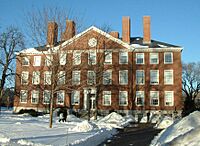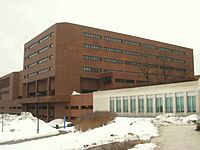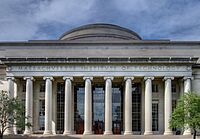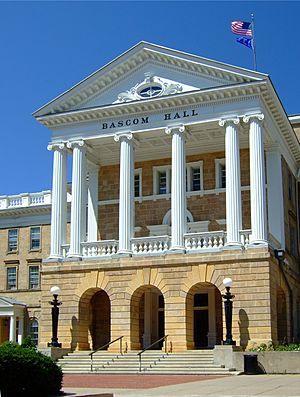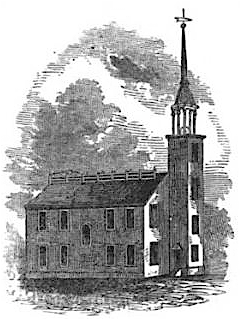Pauline Maier facts for kids
Quick facts for kids
Pauline Maier
|
|
|---|---|
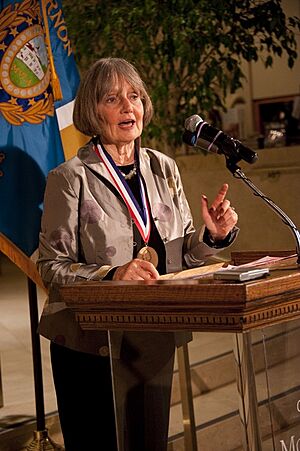
Maier in 2011
|
|
| Born |
Pauline Alice Rubbelke
April 27, 1938 St. Paul, Minnesota, U.S.
|
| Died | August 12, 2013 (aged 75) Cambridge, Massachusetts, U.S.
|
| Education | |
| Occupation | Historian |
| Known for | Interest in history and education |
| Spouse(s) | Charles S. Maier |
Pauline Alice Maier (born Rubbelke; April 27, 1938 – August 12, 2013) was a well-known historian of the American Revolution. She also studied the time just before and after the war. She was a professor of American History at the Massachusetts Institute of Technology (MIT).
Maier became famous over her 50-year career. She wrote many popular and praised history books and articles. She was a member of the American Academy of Arts and Sciences. She taught college students and created textbooks and online courses. She appeared on TV shows like PBS and the History Channel. She also wrote for The New York Times for 20 years. In 2011, Maier was the President of the Society of American Historians. She won the 2011 George Washington Book Prize for her book Ratification: The People Debate the Constitution, 1787–1788. She passed away in 2013 at the age of 75.
| Top - 0-9 A B C D E F G H I J K L M N O P Q R S T U V W X Y Z |
Life and Career of a Historian
Early Life and Education
Pauline Rubbelke was born in St. Paul, Minnesota, in 1938. She went to local schools. Her father was a firefighter, and her mother was a homemaker. Pauline was one of five children. When she started college at Radcliffe College, she first wanted to be a newspaper writer.
She wrote for The Harvard Crimson, a student newspaper. She also worked at the Patriot Ledger newspaper during her summers. In 1960, she earned her bachelor's degree in history and literature from Radcliffe. There, she met her future husband, Charles S. Maier. After college, they both studied in England on special scholarships. Pauline went to the London School of Economics and Political Science. After their studies, they got married and traveled around Europe.
The couple returned to Harvard University for their PhD degrees. Pauline first planned to study modern urban studies. But after taking a class on "Colonial and Revolutionary America," she found her true passion. She said, "Once you get into the 18th century, you never get out." Both Pauline and Charles earned their PhDs from Harvard. They raised two daughters and a son in Cambridge, Massachusetts. Maier also enjoyed gardening and cooking at their family's weekend home.
Teaching and Leadership
Maier taught at the University of Massachusetts Boston for nine years. She also taught for one year at the University of Wisconsin. In 1978, she joined the Massachusetts Institute of Technology (MIT) as a professor. Throughout her career, she held positions at five well-known universities. She also received many awards and fellowships. Until 2011, she taught several courses on Early American history. She also co-taught a class called "Riots, Strikes and Conspiracies in American History."
In 1985, Maier led a committee at MIT to improve its humanities programs. Her ideas helped expand women's studies and create new degree programs. They also started a PhD program combining history and anthropology. In 1998, MIT faculty gave Maier the Killian Award. This award is given to one senior professor each year for outstanding achievements.
Maier became a member of the American Antiquarian Society in 1976. In the 1990s, she helped start "The Historical Society" group. This group aimed to promote polite discussions among historians. In 1998, she was elected a "History Fellow" of the American Academy of Arts and Sciences. In 2010, Maier became one of only two women to be honorary members of the Colonial Society of Massachusetts since 1947.
In 2011, Maier became the President of the Society of American Historians. This group focuses on excellent writing in history. Famous past presidents include David McCullough. In 2012, President Obama appointed Maier to a special board. This board helps teachers learn more about the United States Constitution.
Writing Style and Research
Maier's writing was clear and serious. Her books were popular with both scholars and general readers. She believed in telling a good story based on careful research. For her book Ratification, she learned from author Barbara Tuchman. Tuchman taught that a writer should build suspense. They should only reveal information when the characters in the story would have known it.
Maier's research method involved comparing different things to find new questions. For example, in American Scripture, she found over 90 local declarations of independence. She then compared them to the famous Declaration of Independence. She showed that support for independence grew because people knew about it. Newspapers spread the word widely. Ideas and responses to events spread across different colonies.
As a writer of popular history, she tried to understand her subjects as real people. She wanted to know their personal stories, not just their public actions. She believed these personal details helped readers connect with history.
Teaching History to Everyone
Maier received special grants to create learning materials. These were for college courses and high school teachers. She felt that many states did not teach American history well enough. She believed that in a democracy like the U.S., every student should understand how the Declaration and the Constitution were made. They should also know how these documents changed over time. She taught that things we assume are true were not always so. Students should learn that things can and do change. She said, "Every time you understand what's distinctive about a different time, you are understanding what is distinctive about our time."
Maier's Historical Ideas
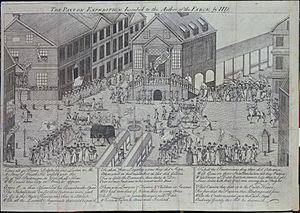
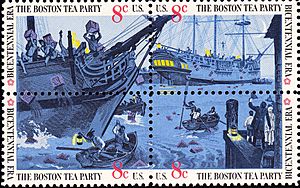
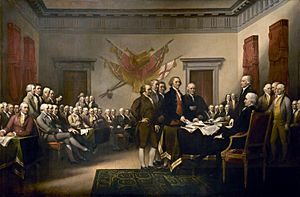
Maier's historical work is part of the "Neo-Whig" school of thought. This approach was started by historian Bernard Bailyn. Other historians like Gordon S. Wood and Edmund S. Morgan also belong to this group. Neo-Whigs believe that radical English ideas about freedom greatly changed American beliefs and society. These ideas about natural rights and individual liberty changed politics, economy, and culture.
Neo-Whigs from the 1950s onward avoided the overly proud view of earlier "Whig historians" of the Revolution. They looked at the British Empire more broadly. They also explored differences among American Patriots and within each colony. They even included the stories of those who remained loyal to Britain (Tories). Maier's book Ratification: The People Debate the Constitution 1787–1788 shows how Patriot ideas changed.
Maier's book "American Scripture: The Making of the Declaration of Independence" explains the connections between these ideas. Her book "From Resistance to Revolution: Colonial Radicals and the Development of American Opposition to Britain, 1765–1776" explores how protests grew into violence.
Maier also wrote about how "Early American History" has changed. This field now covers a longer time period. It also includes more places, like the entire continent and Atlantic communities. Topics now include slavery, gender, different ethnic groups, and people living in border areas. Maier believed that while new research is important, it's also good to combine it with older studies. She asked why we shouldn't teach the contributions of earlier scholars in classrooms.
Maier's Published Works
Books and Articles
Maier's books are available in paperback, ebook, and audiobook formats. Many scholars use her works in their studies.
- Ratification: The People Debate (2010): This book explores the politics of how the United States Constitution was approved. Maier won the George Washington Book Prize for this book in 2011.
- American Scripture: Making the Declaration of Independence (1997): This book looks at how the Declaration was written and how its meaning changed over time. It was named one of the best books of 1997 by The New York Times Book Review.
- The Old Revolutionaries: Political Lives in the Age of Samuel Adams (1980): This book tells the stories of five revolutionaries.
- The Declaration of Independence and the Constitution of the United States (1998, 2008): This book includes a short essay by Maier about how the Declaration and Constitution were written.
- From Resistance to Revolution: Colonial Radicals and the Development of American Opposition to Britain, 1765–1776 (1972, 1992): This book shows that leaders of the Sons of Liberty came from middle and upper classes.
Maier also contributed chapters to other books, such as:
- "Declaring Independence" (2010): Her essay was titled "Who really wrote the Declaration of Independence."
- "American Revolution" (2009): She wrote a chapter called "The path toward independence."
- "Abraham Lincoln: great American historians" (2008): Her essay was "The Declaration's Influence."
Some of her scholarly articles include:
- "The Revolutionary Origins of the American Corporation" (1993): This article appeared in The William and Mary Quarterly.
- "Popular Uprisings in Eighteenth-Century America" (1970): This article was also published in The William and Mary Quarterly.
Textbooks and Online Courses
Maier believed that for a democracy to work, citizens should understand history. She wrote college textbooks and used them to teach her students. She also created online courses used by many universities.
Maier also worked on a special online learning project. It was a MUVE (Multi-User Virtual Environment) gaming project called "Revolution." This project allowed younger students to learn history through a virtual game. She also wrote textbooks for high school students taking Advanced Placement courses. She even wrote a textbook for middle schoolers, which was available in braille.
Some of her textbooks and online courses include:
- "America's Documents of Freedom" (2009): This DVD series is for junior high and high school students. It tells the stories behind important U.S. history documents.
- "Inventing America: a History of the United States" (2006): This is a college textbook. Maier was the lead author for the second edition.
- "The American People: A History" (1986): This was a survey textbook for junior high school students.
- "Common Sense and the American Revolution" (2001): This was an online workshop about Thomas Paine's "Common Sense."
- "The American Revolution" (2006): This was an undergraduate course offered through MIT's "open courseware" program.
Popular Reviews and Columns
Maier wrote book reviews and opinion pieces for newspapers like The New York Times. These articles were always about her area of history. She also appeared on radio talk shows.
Some of her reviews for The New York Times include:
- "John Adams" (2001): A review of David McCullough's book about John Adams.
- "The do-it-yourself society" (1998): A review of Paul Johnson's "A history of the American people."
- "Children’s books: … getting it right" (1987): A review of ten children's books about the Revolution and Constitution.
She also wrote opinion pieces for The New York Times, such as:
- "Justice Breyer’s sharp aim" (2010)
- "Jefferson, Real and Imagined" (1997)
Images for kids
 | Frances Mary Albrier |
 | Whitney Young |
 | Muhammad Ali |


